Related Research Articles

Nikolai Ivanovich Vavilov was a Russian and Soviet agronomist, botanist and geneticist who identified the centers of origin of cultivated plants. He devoted his life to the study and improvement of wheat, maize and other cereal crops that sustain the global population.
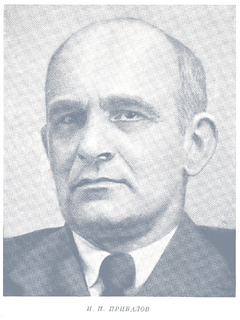
Ivan Ivanovich Privalov was a Russian mathematician best known for his work on analytic functions.
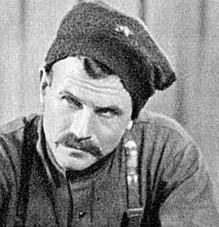
Boris Andreyevich Babochkin was a Soviet and Russian film and theater actor and director. Boris Babochkin was one of the first internationally recognized stars of the Soviet-Russian cinema. He rose to fame with the title role in the classic film Chapaev (1934) and later, in the 1950s, he played a sharp anti-communist character on stage in Moscow, for which he was censored by the Communist Party of the Soviet Union.

Boris Fyodorovich Andreyev was a Soviet and Russian actor. He appeared in 51 films between 1939 and 1982. People's Artist of the USSR (1962). Andreev won Stalin Prizes for Pyryev’s Ballad of Siberia (1946) and The Fall of Berlin (1950).
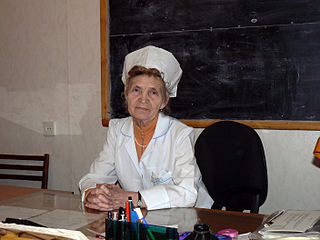
Taisiya Sergeevna Osintseva was a Russian Professor of Neurology, The Honored Scientist of Russia, and The Honorary Professor of the Izhevsk State Medical Academy.
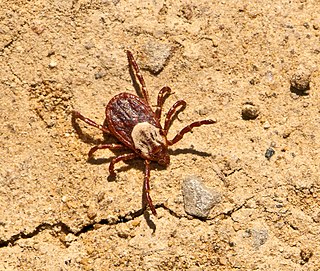
Dermacentor is a genus of ticks in the family Ixodidae, the hard ticks. The genus has a cosmopolitan distribution, with native species on all continents except Australia. Most occur in the Nearctic realm.

Rhipicephalus is a genus of ticks in the family Ixodidae, the hard ticks, consisting of about 74 or 75 species. Most are native to tropical Africa.

Yevgeny Nikanorovich Pavlovsky was a Soviet zoologist, entomologist, academician of the Academy of Sciences of the USSR (1939), the Academy of Medical Sciences of the USSR (1944), honorary member of the Tajik Academy of Sciences (1951), and a lieutenant-general of the Red Army Medical Service in World War II.

Aleksandr Ivanovich Krinitsky was a Soviet statesman and first secretary of the Communist Party of the Byelorussian SSR from May 1924 to December 1925.

Boris Ivanovich Shamanov was a Soviet Russian realist painter, graphic artist, and art teacher, People's Artist of the Russian Federation, who lived and worked in Saint Petersburg. He was a member of the Saint Petersburg Union of Artists, and regarded as one of the representatives of the Leningrad school of painting.
Langat virus (LGTV) is a virus of the genus Flavivirus. The virus was first isolated in Malaysia in 1956 from a hard tick of the Ixodes genus. This virus is antigenically related to Omsk hemorrhagic fever virus, Kyasanur forest disease virus, Alkhurma virus, Louping ill virus and other viruses of the tick-borne encephalitis virus (TBEV) complex. The Langat virus does not pose a significant epidemiological threat in comparison with TBEV. There are no known cases of human diseases associated with LGTV. The Malaysian strain is naturally attenuated and induces neutralizing antibodies to tick-borne encephalitis virus (TBEV) and protection against other TBEV complex viruses in animals.

Boris Moiseyevich Schein is a Russian-American mathematician, an expert in semigroups, and a Distinguished Professor in the Department of Mathematical Sciences at the University of Arkansas.

Viktor Ivanovich Ilyukhin was a Russian State Duma deputy, member of the Communist Party of the Russian Federation, Chairman of the State Duma Committee on security, member of the State Duma's anti-corruption committee, member of the State Duma committee to consider of the federal budget on the defense and security of the Russian Federation, and Chairman of the Movement in Support of the Army.
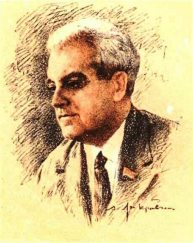
Ivan Ivanovich Artobolevsky was a Soviet scientist and engineer, academic of the Academy of Sciences of the Soviet Union, and Hero of Socialist Labour.
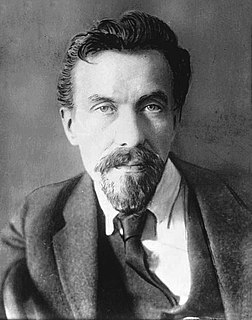
Alexei Ivanovich Rykov was a Russian Bolshevik revolutionary and a Soviet politician and statesman, most prominent as premier of Russia and the Soviet Union from 1924 to 1929 and 1924 to 1930 respectively. He was one of the accused in Joseph Stalin's show trials during the Great Purge.
Pylore Krishnaier Rajagopalan is an Indian vector control scientist, biologist and acarologist, known for his pioneering contributions to the control programmes against vector-borne diseases in India. He is a former director of the Indian Council of Medical Research managed Vector Control Research Centre, Pondicherry. He graduated in 1949 from the Banaras Hindu University and obtained a Masters in Zoology with University First Rank there itself in 1951. In 1952 he joined the fledgling Virus Research Centre in Pune, and worked under the supervision of some of the finest vector control specialists such as Dr T Ramachandra Rao. In recognition of his outstanding work as a young research scientist, in 1957 he was awarded a Fellowship by the Rockefeller Foundation to pursue a Master's program in Public Health from the University of California. He went on to secure a Diploma in Acarology from the University of Maryland at College Park.

Pyotr Ivanovich Lyashchenko was a Russian economist and a specialist in the field of economy of agriculture and history of the national economy of Russia and the USSR. Professor, Rector of Tomsk Imperial University in 1916.
Maria Vladimirovna Pospelova-Shtrom (1902–1991) was a 20th century parasitologist best known for her work delineating the biology and public health importance of ticks in western Asia and eastern Europe, contributing to the reduction of the incidence of tick-borne diseases, especially tick-borne relapsing fever.

Vladimir Ivanovich Picheta was a Belarussian and Soviet historian, first rector of the Belarusian State University, academician of the Academy of Sciences of the BSSR since 1928, Honorary Professor of the BSSR (1926), Corresponding Member of the USSR Academy of Sciences and Arts since 1939, Academician of the USSR Academy of Sciences since 1946.

Natalia Aleksandrovna Filippova was a world authority on the taxonomy of mites and especially ticks. Her monographs on the identification, morphology, development, distribution and behaviour of the family Argasidae and the sub-families of Ixodinae and Amblyomminae are standard works on these important vectors of disease.
References
- ↑ Uspensky, Igor (2008). "Pomerantsev, Boris Ivanovich". In Capinera, John L. (ed.). Encyclopedia of Entomology (2 ed.). Springer. pp. 2998–2999.